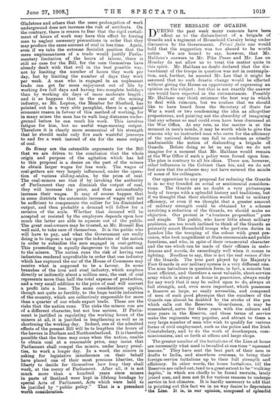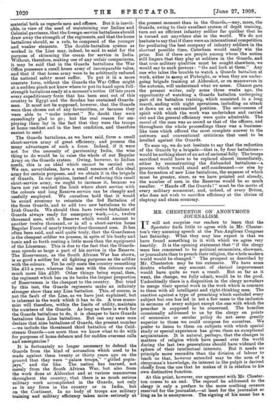THE BRIGADE OF GUARDS. D URING the past week many rumours
have been afloat as to the disbandment of a brigade of Guards and a regiment of Household Cavalry being under discussion by the Government. Prima fade one would hold that the suggestion was too absurd to be worth notice. We are bound to say, however, that Mr. Haldane's answers to Mr. Pike Pease and Mr. Lee on Monday do not allow us to treat the matter quite in this spirit. Mr. Haldane no doubt declared that the dis- bandment of the troops in question was not in contempla- tion, and, further, he assured Mr. Lee that it might be assumed that no such drastic change would be effected without giving the House an opportunity of expressing an opinion on the subject ; but that is not exactly the answer one would have expected in the circumstances. Possibly Mr. Haldane may think reticence the best way in which to deal with rumours, but we confess that we should like to have heard from the Secretary of State for War a word or two condemning the idea as altogether preposterous, and pointing out the absurdity of imagining that any scheme so mad could even have been discussed at the War Office. At any rate, as the matter is at the moment in men's minds, it may be worth while to give the reasons why no instructed man who cares for the efficiency of the national defence can fail to condemn as utterly inadmissible the notion of disbanding a brigade of. Guards. Before doing so let us say that we do not imagine for a moment that Mr. Haldane would remain at the War Office if such a policy were forced upon him. The plan is contrary to all his ideas. There are, however,_ other influences in the Cabinet than his, and we do not feel sure that the scheme may not have entered the minds of some of his colleagues.
Our opposition to any proposal for reducing the Guards is in no way founded on social or sentimental considera- tions. The Guards are no doubt a. very picturesque body of troops with a splendid history and traditions, but if we thought that their abolition would tend to military efficiency, or even if we thought that a greater amount of military strength could be obtained by a scheme involving a reduction of the Guards, we should make no objection. Our protest is "a business proposition" pure and simple. The public, who know little about military problems, are too much inclined to think of the Guards as primarily smart Household troops who perform duties in London like the trooping of the colour with great pre- cision, who look magnificent at State ceremonials and public functions, and who, in spite of their ornamental character and the use which can be made of their officers in melo- dramas and novels, do exceedingly well when it comes to fighting. Needless to say, this is not the real raison. d'etre of the Guards. The true part played by his Majesty's Foot Guards in our military system is a very different one. The nine battalions in question form, in fact, a minute but. most efficient, and therefore a most valuable, short-service army which is always at home in peacetime, always ready for any work that it may be called upon to do, always at full strength, and, even more important, which possesses a Reserve so large, so easily accessible, and composed of men of such good physique that the numbers of the Guards can almost be doubled by the stroke of the pen which calls out the Reserves. Guardsmen, it may be remembered, serve for three years with the colours and nine years in the Reserve, and these terms of service make the regiments very popular, and attract to them a very large number of men who wish to qualify for various forms of civil employment, such as the police and the Irish Constabulary, and to do the work of doorkeepers, com- missionaires, and so forth at offices and large shops.
The greater number of the battalions of the Line at home are necessarily what used to be called at one time " squeezed lemons." They have sent the best part of their men in drafts to India, and elsewhere overseas, to bring their foreign-service battalions up to their full strength and efficiency. In other words, the home battalions, till the Reserves are called out, tend to a great extent to be "walking depOts," in which are chiefly to be found recruits, lately joined men, and men not fit for various reasons to undergo service in hot climates. It is hardly necessary to add that in pointing out this fact we in no way desire to depreciate the Line. It is, in our opinion, composed of splendid material both as regards men and officers. But it is inevit- able, in view of the need of maintaining our Indian and Colonial garrisons, that the foreign-service battalions should draw away the strength of the regiments, and that the home battalions should, as a rule, be composed of the younger and weaker elements. The double-battalion system as worked in the Line may, indeed, be said to exist for the purpose of skimming the cream for service in India. Without, therefore, making use of any unfair comparisons, it may be said that in the Guards battalions the War Office possesses a small home army of incomparable value, and that if that home army were to be arbitrarily reduced the national safety must suffer. To put it in a more concrete form, without the Guards the War Office might at a sudden pinch not know where to put its hand upon full- strength battalions ready at a moment's notice. Of late years every expeditionary force that has - been sent out of this country to Egypt and the Soudan has contained Guards- men. It must not be supposed, however, that the Guards were thus chosen out of any favouritism, or because they were able to "make interest." No doubt they were exceedingly glad to go ; but the real reason for em- ploying them lay in the fact that they were the troops at home readiest and in the best condition, and therefore easiest to send.
The Guards battalions, as we have said, form a small short-service army of great efficiency, and possess the many advantages of such a force. Indeed, if it were not for the necessity of garrisoning India, the wise thing to do would be to raise the whole of our Regular Army on the Guards system. Owing, however, to Indian needs, this is an ideal which cannot be carried out. We can, nevertheless, have a small measure of this ideal army for certain purposes, and we obtain it in the brigade of Guards. In our opinion, instead of reducing this small short-service army, we ought to increase it, because we have not yet reached the limit where short service with the colours and long Reserve service can be cheaply and usefully employed. We ourselves hold that it would be sound economy to reinstate the 3rd Battalion of the Scots Guards, and to add two new battalions to the Irish Guards. We should then have twelve battalions of Guards always ready for emergency work,—i.e., twelve thousand men, with a Reserve which would amount to another twelve thousand, or in all a short-service home Regular Force of nearly twenty-four thousand men. It has often been said, and said, quite truly, that the Guardsman is the cheapest soldier we possess, in spite of his busby and tunic and so forth costing a little more than the equipment of the Linesman. This is due to the fact that the Guards- man spends so large a part of his service in the Reserve. The Reserveman, as the South African War has shown, is as good a soldier for all fighting purposes as the soldier with the colours. Yet he only costs the country something like ..tl5 a year, whereas the man with the colours costs much more like £120. Other things being equal, then, the regiment which has on its books the largest proportion of Reservemen is the cheapest to the country. But tried by this test, the Guards regiments make an infinitely stronger show than any Line battalion. This, of course, is not the fault of the Line, as we have just explained, but is inherent in the work which it has to do. A. true econo- mist will therefore, within the limits of utility, maintain the numbers of the Guards. As long as there is work for the Guards battalions to do, it is cheaper to have Guards battalions than Line battalions. But can any sane man declare that nine battalions of Guards, the present number —we include the threatened third battalion of the Cold- stream Guards—are more than we know what to do with for purposes of home defence and for sudden overseas calls and emergencies ?
It is fortunately no longer necessary to defend the Guards from the kind of accusation which used to be made against them twenty or thirty years ago on the ground that they were "palace troops," "gilded popin- jays," and the like. The nation has learned, not merely from the South African War, but also from the work done at Aldershot and at various manceuvres throughout the country, that there is as much serious military work accomplished in the Guards, not only as in any force in the country or in India, but on the Continent, In no body of troops are military training and military efficiency taken more 'seriously at the present moment than in the Guards,—nay, more, the Guards, owing to their excellent system of depot training, turn out an efficient infantry soldier far quicker that he is turned out anywhere else in the world. We do not hesitate to say that if there were an international competition for producing the best company of infantry soldiers in the shortest possible time, Caterham would easily win the prize. But if there are people among whom the notion still lingers that they play at soldiers in the Guards, and that true military qualities must be sought elsewhere, we would say to such persons : "Go and look at them." Any one who takes the trouble to watch a Guards battalion at work, either in camp at Pirbright, or when they are under- going brigade training at Aldershot, or on manceuvres in the autumn, will understand what we mean. Chance gave the present writer, only some three weeks ago, the opportunity of watching a Guards battalion undergoing part of its battalion training, which consisted in a long march, ending with night operations, including an attack at dawn on an entrenched position. The seriousness of spirit with which the work was undertaken and carried out and the general efficiency were quite admirable. The moral of the men was as sound as that of the officers, and throughout the whole proceedings there was a business- like tone which offered the most complete answer to the outworn and conventional criticisms that used to be levelled against the Guards.
To sum up, we do not hesitate to say that the reduction of the Guards by a brigade—that is, by four battalions— would be nothing short of an act of national folly. The troops sacrificed would have to be replaced almost immediately, either by reconstructing the disbanded battalions—a process which would stand self-condemned—or else by the formation of new Line battalions, the expense of which must be greater, since, as we have pointed out already, the number of men in the Reserves would be so much smaller. "Hands off the Guards ! " must be the motto of every military economist, and, indeed, of every Briton, who does not wish to sacrifice efficiency at the shrine of claptrap and sham economy.























































 Previous page
Previous page